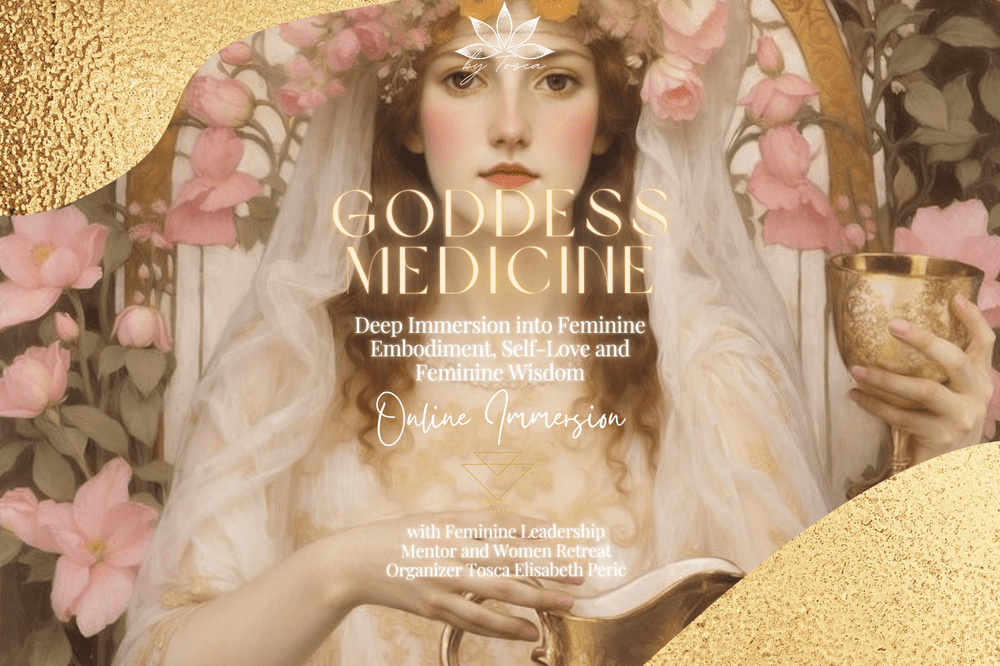I am Tosca
Welcome Goddess!
The Taboo of Questioning Motherhood and the Idealization of Mothers in a Patriarchal Society
In many societies, motherhood is idealized to the point of becoming almost sacred. Mothers are often placed on a pedestal, expected to embody selflessness, unconditional love, and tireless devotion. While this reverence may seem positive, it can create harmful dynamics by silencing conversations about the complexities and challenges of motherhood. This idealization is deeply rooted in patriarchal values, which both glorify and burden women in their roles as mothers while discouraging critique or exploration of the wounds these roles can create.
Motherhood as the Ultimate Role
Patriarchal societies have long upheld motherhood as the pinnacle of a woman’s identity. Women are often taught that their primary value lies in their ability to bear and nurture children. This glorification serves several societal purposes:
Motherhood as Madonna
Motherhood as Madonna is a concept that intertwines cultural, religious, and psychological archetypes surrounding motherhood. The “Madonna” archetype, rooted in the image of the Virgin Mary from Christian traditions, represents the idealized, saintly mother figure—pure, self-sacrificing, nurturing, and devoted entirely to her child. This archetype has deeply influenced societal expectations of women and mothers, shaping narratives about femininity and the “right” way to mother.
Understanding the Madonna Archetype in Motherhood
- Idealization of Sacrifice
The Madonna archetype glorifies the mother’s role as one of endless giving and selflessness. While nurturing and care are natural aspects of motherhood, this ideal can pressure mothers to suppress their individuality, desires, or needs in favor of their children and family. - Purity and Virtue
The Madonna figure often embodies moral purity and perfection, placing an unrealistic expectation on mothers to be morally faultless and always “good.” This creates challenges when real-life emotions like anger, exhaustion, or frustration inevitably arise. - Cultural Legacy
Across many cultures, this archetype has influenced how motherhood is perceived and celebrated. It shapes rituals, celebrations, and even societal judgments around mothers who deviate from these idealized norms. - Impact on Modern Mothers
The Madonna ideal often conflicts with contemporary realities. Women today navigate careers, relationships, and self-discovery, making it difficult to adhere to the outdated notion of constant, sacrificial motherhood. The burden of trying to embody the Madonna can lead to feelings of guilt, inadequacy, or burnout.
Moving Beyond the Madonna Ideal
Embracing a more holistic view of motherhood means acknowledging its complexity. A mother can be loving and nurturing while still having personal boundaries, ambitions, and flaws. Celebrating diverse expressions of motherhood—be it through creativity, sensuality, or independence—helps dismantle the unrealistic standards set by the Madonna archetype.
Motherhood, in all its forms, should honor the wholeness of women, empowering them to nurture not just their children but also themselves and we can finally allow ourselves to let go of that unrealistic ideal of the Madonna-like Mother in society.
Control Over Women’s Lives
By positioning motherhood as a woman’s highest calling, patriarchal systems reinforce the idea that women should prioritize family over personal ambition or autonomy.
This expectation limits women’s opportunities and discourages deviation from traditional roles.
Unrealistic Standards
Mothers are often expected to be perfect: endlessly patient, nurturing, and self-sacrificing.
These standards dismiss the humanity of mothers, leaving little room for flaws, struggles, or individuality. As children, many of us unconsciously adopt the belief that our mothers should be “perfect” and meet all our emotional and physical needs flawlessly. This idealized view makes it difficult for us to see them simply as human beings, with their own flaws, limitations, and complexities. We may feel that acknowledging their shortcomings is an act of disloyalty or disrespect, leading to guilt or conflict when we try to reconcile their imperfections with our expectations.
This dynamic often arises from societal narratives that position mothers as selfless caregivers who must embody unconditional love and wisdom at all times. It can also stem from our innate dependence on them during childhood, when we needed them to provide security and guidance. However, as we grow, it’s essential to release the expectation of perfection and allow ourselves to see our mothers as they truly are—imperfect individuals shaped by their own experiences and challenges. Doing so doesn’t negate their love or efforts; instead, it creates space for a more authentic understanding of our relationship with them, and ultimately, ourselves.
Join The Letting Go Club
12 Month Journey of Feminine Embodiment, Self-love, Sisterhood, Letting Go & Musings

Reclaim your energy. Reclaim your power. Embrace your feminine flow. Sign up here.
The Taboo of Questioning Mothers
In this framework, questioning one’s mother or discussing the shortcomings of motherhood becomes taboo. Society often frames mothers as untouchable figures, whose sacrifices should exempt them from criticism. This taboo perpetuates the silence around the emotional wounds and unmet needs that can arise within the mother-child relationship.
Why It’s Hard to Question Mothers
- Guilt and Shame
- Many individuals feel immense guilt for even thinking critically about their mother’s behavior, as though it negates her sacrifices or love.
- Patriarchal narratives teach us to suppress our pain and “be grateful” for what we received, no matter how inadequate or harmful it might have been.
- Fear of Rejection
- Questioning a mother’s role may provoke fear of alienation or further emotional disconnection, particularly if the relationship is already strained.
- Children often internalize the belief that speaking out about their pain makes them ungrateful or disloyal.
- Social Stigma
- Those who voice their struggles with their mother are often met with disbelief or judgment, reinforcing the idea that mothers are beyond reproach.

The Idealization of Motherhood in a Patriarchal Context
The idealization of motherhood often reflects patriarchal values that seek to control and define women’s roles. This idealization has several negative consequences:
1. Erasure of Mothers’ Humanity
By holding mothers to superhuman standards, society strips them of their individuality and humanity. They are expected to give endlessly without acknowledgment of their own needs, desires, or struggles.
2. Perpetuation of Shame
When mothers fall short of these idealized standards—whether due to personal limitations, systemic barriers, or their own unresolved wounds—they often experience profound shame.
- This shame can prevent them from seeking help or addressing the root causes of their struggles, perpetuating cycles of dysfunction.
3. Denial of Complexity
The mother-child relationship is complex, shaped by both love and pain. Idealizing mothers denies this complexity and stifles honest discussions about how familial relationships impact emotional and psychological development.
A child will naturally choose to maintain the attachment bond with mother over authenticity, because attachment is survival to a child.
Codependent mothers often place their daughters in a deeply conflicting emotional dynamic. The unspoken message becomes:
“Choose between my approval and staying small to protect my feelings, or risk losing my love by embracing your full potential and surpassing me.”
This underlying tension creates a painful dilemma for the daughter, as it feels like she must sacrifice either her mother’s affection or her authentic self. Such dynamics can stifle the daughter’s personal growth and perpetuate patterns of guilt and self-betrayal. Recognizing this pattern is the first step toward breaking free and reclaiming one’s autonomy.
Why we are probably denying the emotional immaturity of our mother (and I do understand you fully)
As children, our deepest desire is to feel unconditionally loved and accepted by our mothers. This longing can make it difficult to confront the possibility of their emotional immaturity, now that we are adults and understand what is going on. From an early age, we are conditioned to look up to our mothers, believing in their role as wise and guiding figures. It can feel deeply unsettling—even like an abandonment—to realize that they may lack the emotional tools we yearn for, especially when we look to them for mentorship or wisdom in times of need.
We often hold onto the hope that our mothers can offer us the guidance we seek—a hope rooted in the idealized image of a nurturing, all-knowing figure. However, this is often an illusion. The truth is, we cannot expect wisdom or understanding from those who have not traveled our unique path. The world evolves rapidly—economically, socially, emotionally, and technologically—and the challenges we face today are vastly different from those of previous generations. This generational gap, combined with a historical lack of emphasis on emotional awareness and self-development, makes it unlikely that they can fully comprehend or guide us in navigating the complexities of our modern lives.
There is a lot to grieve about here. When a mother’s emotional maturity is limited, it can act as a barrier, preventing the relationship from deepening despite your best efforts. This realization can bring feelings of sadness and loss, as it highlights the gap between the connection you wish for and the one that is possible. Read here more about grieving the mother wound.
For many of us, this disconnect has existed since childhood, creating an early and lasting sense of separation. As members of a generation born into a world of heightened awareness and expanding self-development, we often find ourselves grieving this unmet longing for understanding and support. But recognizing this gap also empowers us to seek the wisdom and mentorship we need elsewhere, breaking free from unrealistic expectations and embracing our own capacity for growth and healing.
Identifying the signs of emotional immaturity of our mothers is a crucial step in freeing ourselves from cycles of self-blame and the feeling of being stuck. It helps us break away from the pattern of returning to our mothers with the hope that this time things will change, only to feel disappointed again. Recognizing these signs allows us to accept the limitations of the relationship, shift our expectations, and focus on our own healing and emotional growth.

If you’re enjoying this, subscribe to my self-love letters for free.
How to recognize the immaturity of your mother
Conversations with her often remain superficial, focusing on updates or day-to-day happenings, with little room for emotional depth. She may engage in petty behaviors such as gossip, drama, or retaliation, often fueled by rigid, black-and-white thinking about right and wrong. Her parenting style might have been authoritarian or aligned with traditional, old-school methods, and she struggles to see you as a full adult, continuing to treat you as a child.
Inner reflection or self-improvement is not a priority for her—she may dismiss therapy or personal growth efforts outright. Attention-seeking behaviors and a strong focus on maintaining her image often guide her actions, while she resists accepting help or taking steps to improve her situation, despite frequently complaining or expressing dissatisfaction.
Constantly under stress or crisis, she may adopt a helpless or victimized mindset, avoiding deeper emotional work or conflict resolution. Deep emotions often unsettle her, leading her to dismiss or trivialize others’ feelings, urging people to “just get over it” and move on. Instead, she prefers to ignore problems, sweeping issues under the rug to maintain the appearance of harmony.
Criticism is a frequent theme; she may compare or evaluate you against others, often in a way that feels diminishing. Effort in the relationship is imbalanced—you may find yourself doing most of the work while she makes excuses or puts minimal effort into maintaining the connection. At the same time, she may express entitlement or indignation, guilt-tripping you for not spending more time with her, particularly when she’s anxious or seeking constant contact.
Her kindness may be inconsistent, sometimes more evident when you’re struggling but distant or withholding when you’re doing well. This pattern can leave you feeling unsupported and frustrated, as her actions often stem from unresolved emotions and unmet needs rather than genuine connection.
Emotionally Immature Mothers can be highly developed in other parts of their lives
Emotionally immature mothers can still excel and be highly accomplished in other areas of their lives. They may be successful in their careers, creative endeavors, or social circles, demonstrating intelligence, skill, and competence in these domains. Emotional immaturity does not necessarily mean a lack of ability or achievement—it simply reflects limitations in emotional awareness, regulation, and interpersonal dynamics.
Such individuals may struggle with processing emotions, forming deep emotional connections, or addressing conflict constructively, but this doesn’t diminish their ability to be resourceful, hardworking, or talented in other aspects of life. Recognizing this complexity is important; it allows us to see them as multifaceted individuals while also acknowledging and addressing the emotional gaps that affect the parent-child relationship. This understanding can help us approach the dynamic with greater clarity, empathy, and self-awareness.
Limiting Roles, that mothers are putting their daughters into (unconsciously)
Emotionally immature mothers often place their daughters into roles that are limiting, dehumanizing, and emotionally taxing. These roles, while varying from one relationship to another, tend to revolve around the mother’s emotional needs and expectations, often disregarding the daughter’s own autonomy and emotional well-being. The result is a dynamic where the daughter’s sense of self is shaped by these imposed roles, leading to deep emotional confusion and self-doubt.
One common dynamic is when the daughter is seen as a rival or threat to the mother’s sense of self-worth. This may arise from jealousy or insecurity on the mother’s part, and it can lead to the mother undermining or diminishing her daughter’s achievements. In these cases, the daughter feels the need to compete for approval and attention, often facing criticism or subtle sabotage when she excels.
In other instances, a mother may view her daughter as a confidante—someone to whom she can unload her emotional burdens. While this may seem like a normal mother-daughter relationship, it often places the daughter in the position of being an emotional caretaker, shouldering the mother’s problems without receiving support in return. This role deprives the daughter of the opportunity to develop her own emotional identity and causes her to become entangled in her mother’s unresolved issues.
Some mothers treat their daughters as companions to fill an emotional void, expecting constant availability, reassurance, and emotional connection, without respecting the daughter’s need for personal space or independence. The daughter may find herself always available to meet the mother’s needs, whether for company or for support, leading to a sense of being used rather than valued for her true self.
In other cases, the daughter might be treated as a trophy—an object to be paraded in front of others as a reflection of the mother’s success or social standing. Her accomplishments or appearance may be used to boost the mother’s self-esteem, reducing her to an accessory rather than recognizing her as an autonomous individual with her own identity and goals.
For some, the daughter is forced into the caregiver role, where she is expected to soothe the mother’s fears, fix her problems, and provide emotional stability. This can leave the daughter feeling responsible for the mother’s well-being, causing emotional exhaustion and neglect of her own needs. This dynamic can also create an unhealthy sense of guilt or obligation, where the daughter feels unable to set boundaries without fear of disappointing or angering her mother.
In the most painful of scenarios, the daughter may feel like furniture—simply taking up space without being seen or appreciated for who she is. The mother may view her as a burden or nuisance, an inconvenience that demands attention without offering anything in return. This leaves the daughter feeling invisible, unimportant, and unloved.
These roles are incredibly painful, yet because they are rooted in the relationship with our mothers, they often feel like the only reality we know. Since these patterns are established in childhood, they can go unchallenged for years, becoming normalized and tolerated as part of the relationship. This dynamic can erode a daughter’s self-esteem, leaving her feeling inadequate and uncertain of her worth. Furthermore, it can set the stage for similar unhealthy patterns to emerge in other relationships, such as those with romantic partners, friends, and even coworkers. The emotional toll of these dynamics can be profound, often leading to a lifetime of struggles with boundaries, self-worth, and emotional independence.
Examples of Behaviors from Emotionally Immature mothers that cause pain:
An emotionally immature mother may frequently interrupt you, steering the conversation back to herself, leaving little space for your thoughts or feelings. She might dismiss your emotions as unimportant, while dominating the room and taking up all the attention. Despite being your mother, she often shows little interest in truly getting to know you or understanding your experiences.
Instead, she may belittle you, making you question your own worth or decisions, often minimizing your thoughts and feelings. This can make you feel guilty for expressing your natural needs, emotions, or setting healthy boundaries. She may attempt to “put you in your place,” ensuring you don’t get too confident or “above your station,” often undermining your self-esteem in the process.
Her perception of your efforts to improve the relationship may be clouded with resentment, viewing it as you trying to prove you’re “better” or “superior” to her. When she’s upset, she might feel entitled to lash out, saying hurtful things, while expecting you to simply accept this without question. She also feels entitled to your time and energy without considering the emotional toll it takes on you.
At times, she may act immature, resisting help or refusing to help herself, throwing tantrums when she feels ignored or neglected. She’s often blind to her own role in creating negative situations, instead blaming others and avoiding self-reflection. Your feelings may be seen as obstacles, things she wants to push aside or ignore to maintain her own sense of control or peace.
In her eyes, the “good daughter” is the one who complies without question, staying silent and dutiful. She may resist any feedback about her behavior or attempts to improve the relationship. Your individuality could be seen as a threat, something to suppress or diminish rather than celebrate. She can be a taker, using others for her needs without any sense of reciprocity or consideration.
In public, she might appear to be the perfect mother, performing motherly behaviors in front of others, but these actions are often more for show than a reflection of genuine connection.
For Emotionally immature mothers love can be viewed as enmeshment, a blending of identities where boundaries are blurred, rather than a healthy connection built on mutual understanding and respect.
They often have a distorted view of key concepts, which affects their relationships with others, particularly with their children. This makes it difficult for their children to feel like individuals, as they may be expected to always cater to the mother’s emotional needs without personal space.
Loyalty is often misunderstood as blind compliance, where the child is expected to follow the mother’s wishes without question or objection. It becomes an obligation, not a choice, and speaking up or asserting personal boundaries can be seen as disloyalty.
Vulnerability, in the eyes of an emotionally immature mother, is viewed as a shameful weakness. Rather than recognizing it as a strength—a means of fostering deeper connection and growth—she may shame her child for expressing any emotions or insecurities, teaching them to hide their true selves.
For these mothers, strength is defined by defiance and obstinance. Rather than being a resilient capacity to adapt to challenges, strength is seen as resistance, pushing back against others and life’s natural flow. This approach can create a power struggle in the relationship, as the mother may resist vulnerability or connection in favor of maintaining control.
Finally, an enemy to an emotionally immature mother is anyone who doesn’t align with her viewpoint. This black-and-white thinking fosters a “you’re either with me or against me” mentality, leaving little room for compromise, differing opinions, or individuality.
These warped views shape the emotional dynamics within the family, making it difficult for children to develop healthy emotional intelligence, boundaries, and self-worth.
Mother Love and The Development of Self-Love
As kids, we relied on our mothers for emotional mirroring—their consistent love and affirmation were crucial for forming our sense of self. When a mother is emotionally immature or unable to provide the emotional support a child needs, the child may wrongly conclude that they are unworthy of love. They may believe that if their mother can’t love them, it’s their fault, and that they must work harder to earn her affection and attention. This belief, though painful, can become a coping mechanism—a way of cushioning the child from the full impact of neglect, rejection, or emotional abandonment. It offers a false hope that, with enough effort, things can be fixed, and they will eventually receive the love and connection they desire.
In adulthood, this unresolved belief can still linger in the background, causing a person to feel trapped by an unreachable ideal: the hope that their mother will one day see them for who they truly are. The truth, however, is that we cannot force someone to see us clearly. As adults, we come to realize that we don’t have the power to change another person’s perspective or heal those early wounds. We must come to terms with the fact that the mother we longed for may never exist in the way we imagined.
All we can do is create some emotional distance and seek the support we need to heal. In doing so, we can become the loving, nurturing adult mother our inner child needed all along.
The Intergenerational Cycle
The taboo of questioning motherhood also perpetuates cycles of unhealed wounds. When children are discouraged from addressing their unmet needs or emotional pain, they are less likely to break free from inherited patterns of dysfunction.
For Mothers: The pressure to embody perfection can lead to emotional burnout, resentment, and unintentional harm to their children.
For Children: The inability to question or process their experiences leaves them carrying unresolved pain, often repeating these patterns in their own relationships or parenting.
Breaking this cycle requires a cultural shift that allows both mothers and children to acknowledge their pain without shame.
Healing the Mother Wound in a Patriarchal Context
Healing begins by dismantling the myths surrounding motherhood and embracing a more nuanced perspective.
1. Normalize Questioning and Complexity
- Create space for open conversations about the joys and challenges of motherhood without judgment or idealization.
- Encourage individuals to explore their relationship with their mother honestly, recognizing that love and pain can coexist.
2. Redefine Motherhood
- Challenge patriarchal definitions of motherhood that prioritize self-sacrifice over self-care.
- Support mothers in pursuing their own fulfillment and individuality beyond their roles as caregivers.
3. Address Systemic Issues
- Advocate for societal changes that support mothers, such as parental leave, affordable childcare, and mental health resources.
- Recognize that systemic pressures, not personal failings, often contribute to maternal struggles.
4. Embrace Healing Practices
- For children, this might involve therapy, journaling, or support groups to process the mother wound and reclaim their voice.
- For mothers, it may mean seeking help to address their own unmet needs or breaking free from societal expectations that no longer serve them.
Conclusion
The taboo of questioning mothers and the idealization of motherhood serve patriarchal systems that both exalt and confine women. Breaking this taboo is an act of liberation—for both mothers and their children. By acknowledging the complexities of motherhood and embracing the humanity of mothers, we can foster deeper healing, more authentic relationships, and a society that values both care and individuality.
Healing the mother wound requires courage, self-compassion, and a willingness to challenge deeply ingrained cultural narratives. It is through this work that we not only free ourselves from cycles of pain but also create a legacy of authenticity and connection for future generations.

Family dynamics often shape two types of children: those who unconsciously repeat the cycles of pain, dysfunction, and unresolved trauma, and those who courageously choose to break free and heal.
Repeating the cycle often stems from a lack of awareness or the belief that things cannot change, while breaking free from generational trauma and the cycle requires bravery, introspection, and intentional effort. You have the power to decide which path you’ll take.
Do you want to address your mother wound, transform your pain into empowerment, and step into your most authentic self? Join my course or sign up for Goddess Medicine today and start your journey toward healing and freedom. Your future self is waiting.
The Courage Threshold – why these blocks are holding you back
How The Mother Wounds Affect Us
Finding Forgiveness for the Mother Wound


